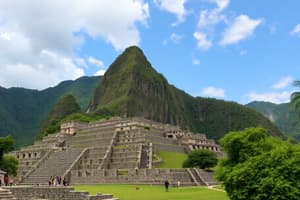Podcast
Questions and Answers
What characterized the Native American cultures before the arrival of Europeans?
What characterized the Native American cultures before the arrival of Europeans?
- Strong connections to the land, respect for nature, and rich spiritual heritage (correct)
- Isolation from other cultures, dependence on European governance, and lack of spirituality
- Reliance on European technologies, disrespect for nature, and absence of social structures
- Nomadic lifestyle, disregard for nature, and lack of social structure
Which European powers were involved in the colonization of North America?
Which European powers were involved in the colonization of North America?
- Italy, Germany, and Portugal
- China, India, and Japan
- Russia, Greece, and Netherlands
- Spain, France, and England (correct)
What impact did the arrival of Europeans have on North America?
What impact did the arrival of Europeans have on North America?
- Isolation from the rest of the world
- No significant impact
- Destruction of all existing cultures and traditions
- Introduction of new technologies, ideas, and political systems (correct)
Which of the following Native American cultures is not mentioned in the text?
Which of the following Native American cultures is not mentioned in the text?
What were some of the skills possessed by the Native American people?
What were some of the skills possessed by the Native American people?
What event ultimately led to the establishment of the United States of America as an independent nation?
What event ultimately led to the establishment of the United States of America as an independent nation?
Which movement was marked by a series of protests, sit-ins, and marches, including the famous March on Washington in 1963?
Which movement was marked by a series of protests, sit-ins, and marches, including the famous March on Washington in 1963?
What was a pivotal factor that sparked the American Revolution?
What was a pivotal factor that sparked the American Revolution?
Which legislation ultimately led to the passage of landmark civil rights legislation, including the Civil Rights Act of 1964 and the Voting Rights Act of 1965?
Which legislation ultimately led to the passage of landmark civil rights legislation, including the Civil Rights Act of 1964 and the Voting Rights Act of 1965?
What continues to shape North American civilization, marked by both triumphs and struggles?
What continues to shape North American civilization, marked by both triumphs and struggles?
Flashcards are hidden until you start studying
Study Notes
North American Civilization
North America is a vast and diverse continent that has undergone many transformations throughout its history. From the rich and diverse Native American cultures that preceded European colonization, to the tumultuous events of the American Revolution and the civil rights movement, and finally to the present-day contemporary society, North America's story is one of change and progress.
Native American Cultures
Before the arrival of Europeans, North America was home to many diverse Native American cultures. These cultures were characterized by strong connections to the land, a deep respect for nature, and a rich spiritual heritage. The Native American people were skilled hunters, farmers, and artisans, and they developed complex social structures and governance systems. Some of the most well-known Native American cultures include the Iroquois, the Navajo, the Apache, and the Sioux.
European Colonization
The arrival of Europeans in the late 15th and early 16th centuries marked the beginning of a new era in North American history. The Europeans brought with them new technologies, ideas, and political systems, which had a profound impact on the continent. The colonization of North America by European powers such as Spain, France, and England led to the establishment of many settlements and the exploitation of natural resources.
American Revolution
The American Revolution was a pivotal moment in North American history. It was a period of political upheaval and conflict that ultimately led to the establishment of the United States of America as an independent nation. The revolution was sparked by a desire for greater political representation and economic independence, and it was fueled by a growing sense of national identity among the American people. The revolution was marked by a series of battles, including the famous Battle of Bunker Hill, and it culminated in the signing of the Treaty of Paris in 1783, which recognized the United States as an independent nation.
Civil Rights Movement
The civil rights movement was a period of social and political upheaval in the United States that lasted from the 1950s to the 1960s. It was a time of intense struggle and activism, as African Americans fought for their basic rights and equal treatment under the law. The movement was marked by a series of protests, sit-ins, and marches, including the famous March on Washington in 1963, where Martin Luther King Jr. delivered his famous "I Have a Dream" speech. The civil rights movement ultimately led to the passage of landmark civil rights legislation, including the Civil Rights Act of 1964 and the Voting Rights Act of 1965.
Contemporary North American Society
Today, North America is a diverse and dynamic continent, marked by its many cultures, languages, and traditions. The region is home to many thriving cities, including New York, Toronto, and Mexico City, and it is a hub of economic activity, with many major industries, including technology, finance, and manufacturing. North America is also a leader in scientific research and academic pursuits, with many world-renowned universities and research institutions. Despite its many successes, however, North America still faces many challenges, including income inequality, environmental degradation, and political polarization.
In conclusion, North American civilization is a rich and complex tapestry that has been shaped by many different factors, including Native American cultures, European colonization, the American Revolution, the civil rights movement, and contemporary society. It is a story of change and progress, marked by both triumphs and struggles, and it is one that continues to evolve to this day
Studying That Suits You
Use AI to generate personalized quizzes and flashcards to suit your learning preferences.




